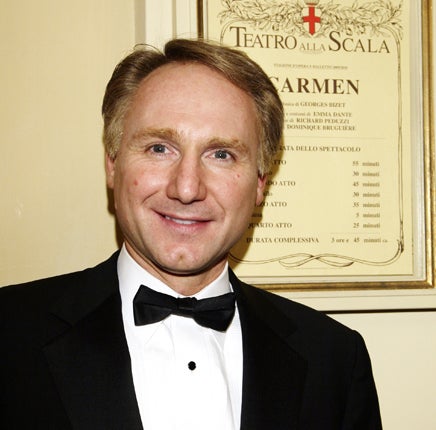Da Vinci Code author Dan Brown tackles Dante's Inferno for new book

His most famous book found Jesus’s bloodline, now Dan Brown is taking his readers into hell following the surprise announcement of a new book, inspired by Dante’s Divine Comedy.
As befitting the author of The Da Vinci Code – and its publicity machine – Brown yesterday planted a series of clues about his next book on social media before revealing with a flourish that it was to be called Inferno.
The 48-year old from New Hampshire has sold over 200 million books, with Angels & Demons and 2009’s The Lost Symbol joining The Da Vinci Code on the bestseller lists. His surprise return follows that of JK Rowling, another expert at shifting millions of books, just months ago.
Brown revealed he had studied the Inferno, the first of three parts of the Divine Comedy, at university but “it wasn’t until recently, while researching in Florence, that I came to appreciate the enduring influence of Dante’s work on the modern world”.
The bestselling author gave little away about the story other than to say: “I am excited to take readers on a journey deep into this mysterious realm, a landscape of codes, symbols, and more than a few secret passageways.”
Editor Jason Kaufman revealed that Harvard symbologist Robert Langdon, as played by Tom Hanks on the big screen adaptations of his earlier work, would once again be the protagonist. He will head back to Europe, presumably Florence, “where he becomes entwined in a mystery that has global ramifications tied to the ominous and truly mesmerizing details of Dante’s masterful work”.
Stephen Milner, Serena professor of Italian at the University of Manchester, said: “If Dan Brown does for Dante what he did for Leonardo, the general public will probably be delighted, while the scholarly community will probably tear out their hair.”
While academics will be nervous, the same could not be said about the retailers. Rik Shane, head of Books at Waterstones, said it was “great news for booksellers. The Lost Symbol broke all sorts of sales records on its release in 2009 and this new title is likely to be the bestselling book of 2013”.
He added: “Like David Bowie, Dan Brown has mastered the art of surprising the world with an unexpected return.”
The Lost Symbol became the fastest-selling hard back since records began, according to Tom Tivnan, features editor of The Bookseller, who added it was positive news. “Big books are what drives the industry.” The Da Vinci Code became the best-selling adult hardback in the world.
With Dante, Brown is coming up against a man with a multi-million dollar industry of his own. Dr Milner said: “Dante already has the most enormous cultural history of adaptation, appropriation and repackaging.”
New translations are regularly released, including one updated version last year that referenced Bob Dylan and Star Trek, as well as new commentaries, cartoons and even video games. This year, Clive James is to release his own translation of the Divine Comedy.
The obsession stretches back to the 14th century, with the first person to do a commentary on the work being Dante’s own son. “Dante has been commented on and rewritten from the generation after his death. Dan Brown will merely be another addition to the Dante industry,” Dr Milner said.
“There’s always been a great Anglo-Saxon fascination with the cult of Dante, and we are talking about a cult,” Dr Milner said. “There’s something disquietingly appropriate about an author like Dan Brown involving himself with a figure that has a cult following dating back to the early 14th century.”
He added: “Dante speaks to the virtues and vices of everyday life and about the fears of what lies beyond. The fascination with Dante is that he’s incredibly modern in his civic focus. He’s also a master of the arts.”
Join our commenting forum
Join thought-provoking conversations, follow other Independent readers and see their replies
Comments
Bookmark popover
Removed from bookmarks